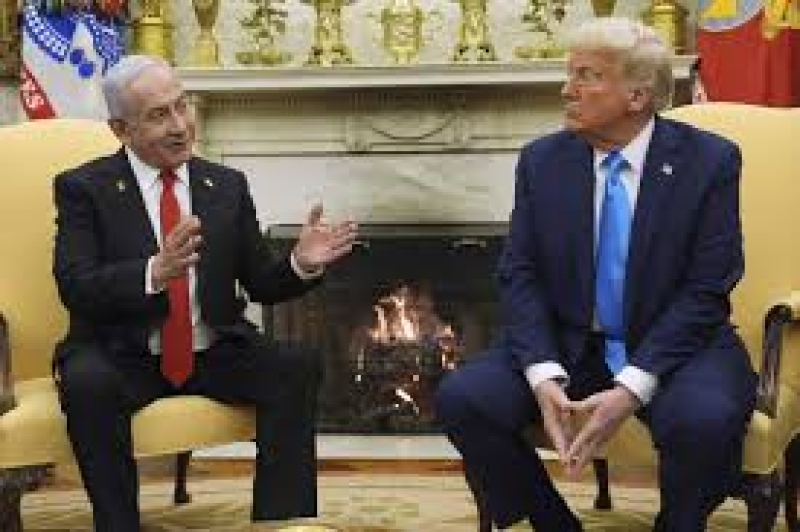- Puppet show enchants Children as Boi Mela comes alive on day 2 |
- DSCC Admin Salam’s drive to make South Dhaka a ‘clean city’ |
- 274 Taliban Dead, 55 Pakistan Troops Killed |
- Now 'open war' with Afghanistan after latest strikes |
- Dhaka's air quality fourth worst in world on Friday morning |
Trump and Netanyahu to Meet Monday on Gaza, Tariffs, and Hostages

President Donald Trump is set to meet with Israeli Prime Minister Benjamin Netanyahu on Monday, marking their second White House sit-down since Trump resumed office. The meeting, confirmed by both the White House and Netanyahu's office on Saturday, will address a range of critical issues, including the ongoing conflict in Gaza, trade tariffs, and regional security dynamics.
This high-level discussion comes amid Israel's continued military operations in Gaza, where Israeli forces have deployed additional troops and are creating a new security corridor aimed at intensifying pressure on Hamas. Israel's defense minister has announced plans to seize large portions of Gaza and incorporate them into Israel's security zones.
The recent escalation follows Israel's resumption of airstrikes on Gaza last month, breaking a fragile ceasefire in an attempt to force Hamas to accept more stringent terms. The White House has supported Israel’s stance, and as a result, hundreds of Palestinians have been killed in the crossfire.
Israel's stated objective is to escalate its military efforts until Hamas returns all hostages taken during the October 7, 2023, attacks, disarms, and withdraws from the territory. Alongside military action, Israel has cut off all food, fuel, and humanitarian aid to Gaza.
In a statement released Saturday, Netanyahu's office confirmed that the two leaders would discuss several key topics, including the contentious tariff issue, the ongoing efforts to secure the release of Israeli hostages, relations with Turkey, the Iranian threat, and opposition to the International Criminal Court (ICC). Israel currently faces a 17% tariff on certain exports, and Netanyahu himself is the subject of an ICC investigation into alleged crimes in Gaza. The U.S. is not a member of the ICC.
Netanyahu's February visit to the White House was his first in Trump's second term, where they discussed Israel's war with Hamas and potential next steps after a ceasefire agreement took hold. During that visit, Trump controversially suggested the U.S. should take "ownership" in redeveloping Gaza into a tourist destination, akin to "the Riviera of the Middle East." This proposal sparked widespread backlash, with Palestinians and Arab nations strongly opposing the idea.
Since then, Netanyahu has faced mounting political pressure in Israel, including protests against his handling of the hostage crisis and his controversial firing of key security officials. There are also growing calls for Netanyahu to take responsibility for intelligence lapses leading up to the October 7 attack.
On Saturday, relatives of the hostages held in Gaza made an emotional appeal to President Trump, urging him to use his influence to push Netanyahu to end the war and prioritize the swift return of the hostages. Ifat Calderon, the aunt of one of the hostages, criticized Netanyahu's military strategy, arguing that it was not effective in securing their release.
Hamas, which holds 59 hostages — 24 of whom are believed to still be alive — has demanded the release of Palestinian prisoners, a permanent ceasefire, and an Israeli withdrawal from Gaza in exchange for the hostages' freedom.
The October 7 attack by Hamas killed about 1,200 people, most of whom were civilians. Since then, over 50,000 Palestinians have been killed in Israel’s military offensive, although the exact number of combatants versus civilians is disputed. Israel claims it has killed around 20,000 militants.
Meanwhile, Netanyahu faces additional challenges as Israeli police arrested two of his close associates this week on allegations of accepting money from Qatar to promote a positive image of the Gulf state in Israel. While Qatar serves as a key mediator in Hamas-Israel negotiations, it denies supporting the militant group. Netanyahu has dismissed the allegations as baseless.
The prime minister is also battling a corruption trial that has kept his political future uncertain. He frequently portrays himself as the target of a "deep state" conspiracy aimed at undermining his leadership.
In the coming months, Trump is expected to embark on his first foreign trip of his second term, which may include visits to Saudi Arabia, Qatar, the UAE, and potentially other Gulf states. He has stated that the trip will be focused on securing investments for U.S. jobs, with a particular emphasis on rewarding Saudi Arabia for its contributions to the U.S. economy. The trip could take place as soon as May.

